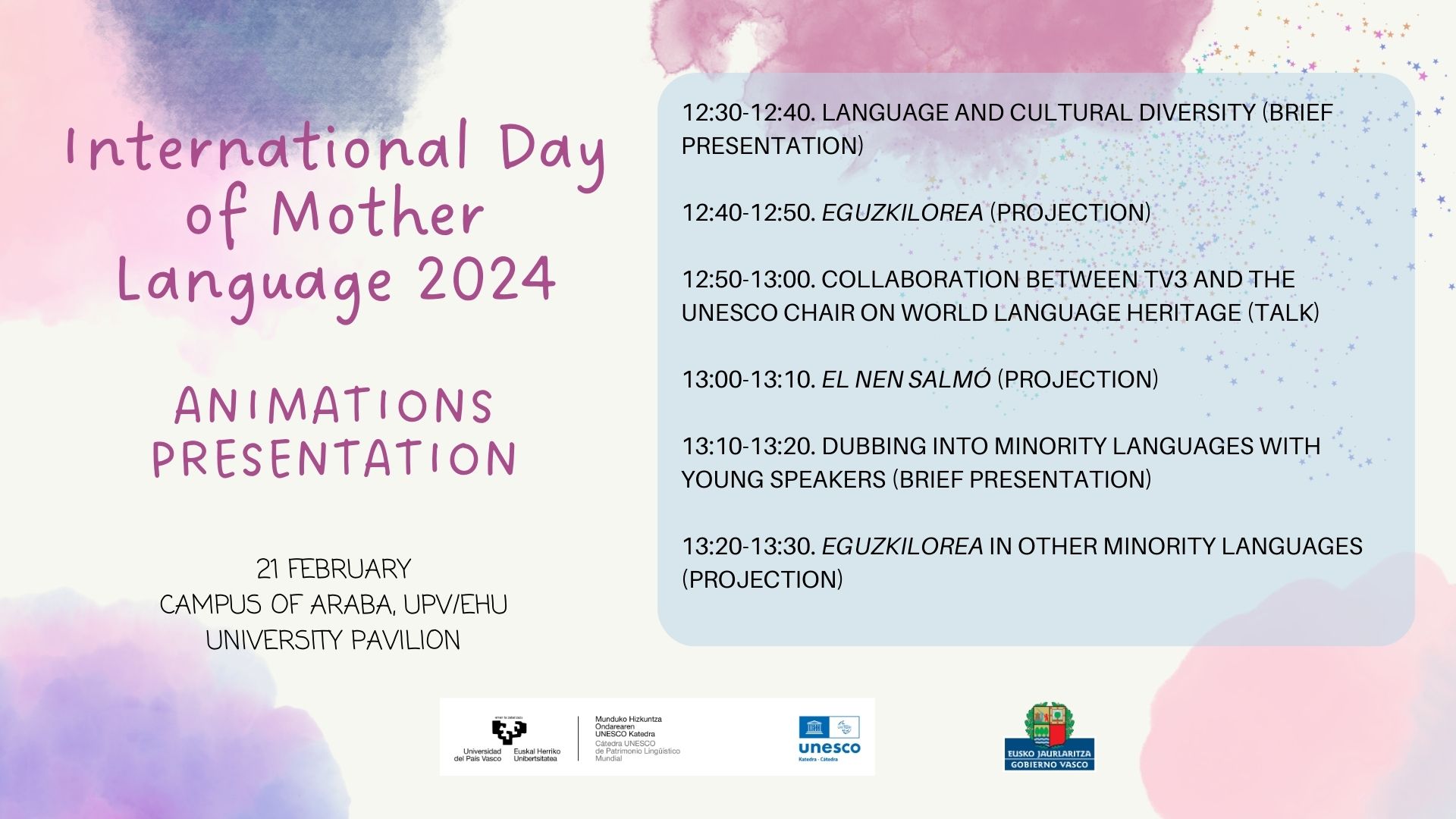International Mother Language Day 2024
Premiere of a series of animations
21st February is the International Mother Language Day. It is an important day to remember the linguistic diversity of the world and, above all, to focus on minority and endangered languages. For this reason, the UNESCO Chair on World Language Heritage has prepared a special initiative to make our contribution.
On that day, the series of animations created together by the Corporació Catalana de Mitjans Audiovisuals and the Unesco Chair on World Language Heritage will have their public premiere. The five animations are based on folktales from around the world and will be available in Basque and Catalan. These tales have been produced for the programme Una mà de contes of Catalunya.
The selected stories originate from oral traditions: the Basque Country and some indigenous communities in South America, Central America, North America and Australia. Specialists from the Unesco Chair on World Language Heritage of the UPV/EHU and the technical and artistic team of the programme Una mà de contes have been in charge of the documentation, selection and monitoring of the stories. The adaptation was the work of Mireia Vidal, children's writer and winner of the Serra de Oro prize. Gustavo Rosemffed (Gusti) was in charge of the illustrations, winner of the Bologna Children's Book Fair prize and illustration teacher at the EINA school. Manuel Barrios Lucena and Isidre Rosich Borges were the director and producer respectively.
See the animations here!
Dubbing for minority language speakers
During one of the projects carried out in Sao Tome and Principe (Africa), one of the animations of the programme Una mà de contes was dubbed into the Forro language. This first non-professional dubbing was the result of the collaboration between María Montroy, the NGO Cooperación Bierzo Sur and the Unesco Chair. The aim of this workshop was to bring together the older generation (whose first language is Forro, a language on the verge of being lost) and the younger generation (who no longer speak Forro and whose first language is Portuguese), so that they could work together to promote, among other things, sensitivity towards languages.
The animation chosen for the dubbing was "El sol i la lluna" from the programme Una má de contes. The people in charge of the programme gave permission for the dubbing and carried out the following work: https://www.ccma.cat/tv3/sx3/el-sol-i-la-lluna/video/6093965 /
This was the precedent for the collaboration agreement that was subsequently signed between the Corporació Catalana de Mitjans Audiovisuals and the Unesco Chair, through which the five previously mentioned stories have been produced in Catalan and Basque.
But the Chair, as usual, and with a focus on minority languages, proposed another challenge: based on the example of the lining, to dub these new stories also in other minority languages of the world. The Meeting of Young Speakers of Minority Languages (HIGA) provided us with a suitable setting for this. Thanks to some of the speakers who took part, Eguzkilore was dubbed into the following languages.
| LANGUAGE | LINK |
| Franco-Provençal | Available |
| Ladin | Available |
| Nahuat | Soon available |
| Saami | Soon available |
| Tyap | Available |
Presentation of the animations prepared between TV3 and the Unesco Chair in World Linguistic Heritage
The official presentation of the animations in Catalonia and the Basque Country will take place on 21st February, International Mother Language Day. The screening will take place in the pavilion of the Alava Campus, between 12:30 and 13:30, as part of the welcome ceremony for international students. In addition to showing the animations, we will talk about linguistic diversity and the process of creating them.
General programme of the international student welcome event: https://www.ehu.eus/es/web/ikasi/harrera-egunak

